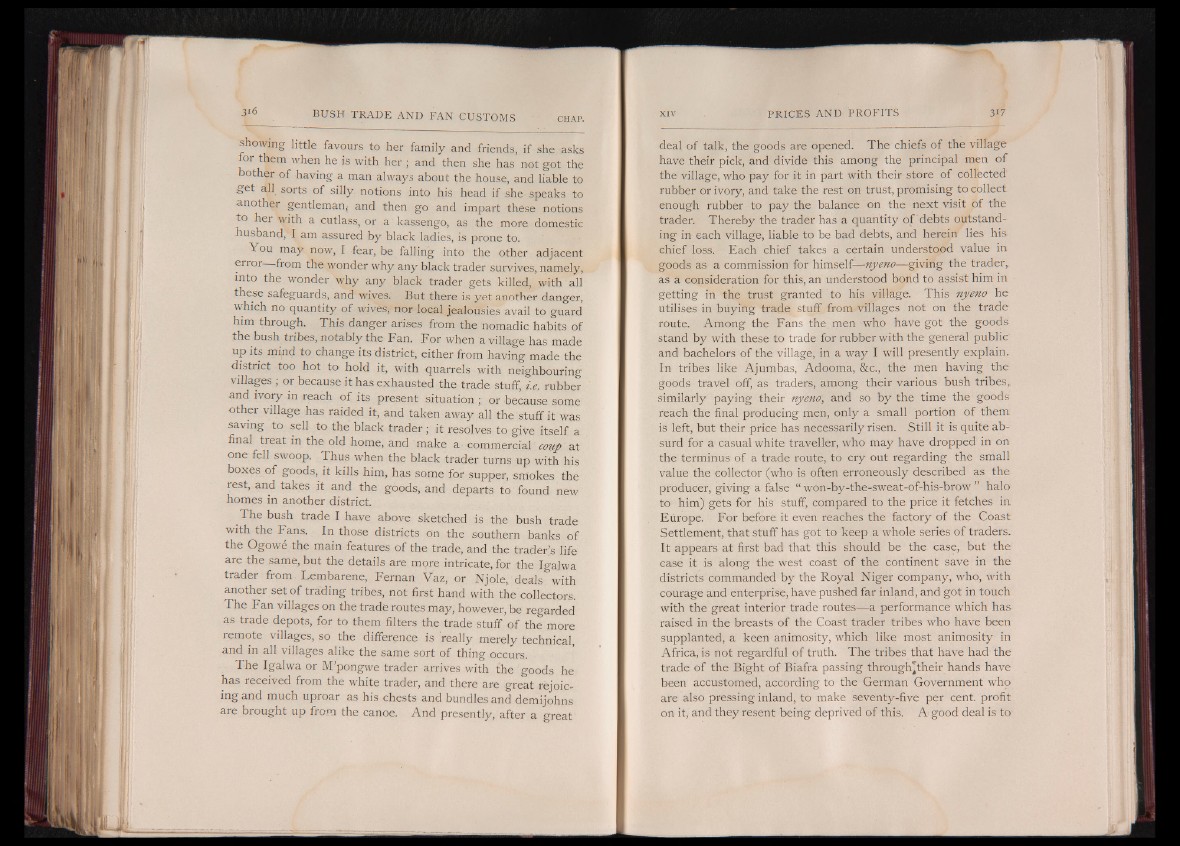
showing little favours to her family and friends, if she asks
for them when he is with her ; and then she has not got the
other of having a man always about the house, and liable to
get all sorts of silly notions into his head if she speaks to
another gentleman* and then go and impart these notions
to her with a cutlass, or a kassengo, as the more domestic
husband, I am assured by black ladies, is prone to.
You may now, I fear, be falling into the other adjacent
error from the wonder why any black trader survives, namely,
into the wonder why any black trader gets killed, with all
these safeguards, and wives. But there is yet another danger,
which no quantity of wives, nor local jealousies avail to guard
him through. This danger arises from the nomadic habits of
the bush tribes, notably the Fan. For when a village has made
up its mind to change its district, either from having made the
district too hot to hold it, with quarrels with neighbouring
villages ; or because it has exhausted the trade stuff, i.e. rubber
and ivory in reach of its present situation ; or because some
other village has raided it, and taken away all the stuff it was
saving to sell to the black trader; it resolves to give itself a
final treat in the old home, and make a commercial coup at
one fell swoop. Thus when the black trader turns up with his
boxes of goods, it kills him, has some for supper, smokes the
rest, and takes it and the goods, and departs to found new
homes in another district.
The bush trade I have above sketched is the bush trade
with the Fans. In those districts on the southern banks of
the Ogowe the main features of the trade, and the traders life
are the same, but the details are more intricate, for the Igajwa
trader from Lembarene, Fernan Vaz, or Njole, deals with
another set of trading tribes, not first hand with the collectors.
The Fan villages on the trade routes may, however, be regarded
as trade depots, for to them filters the trade stuff of the more
remote villages, so the difference is really merely technical,
and in all villages alike the same sort of thing occurs.
The Igalwa or M’pongwe trader arrives with the goods he
has received from the white trader, and there are great rejoicing
and much uproar as his chests and bundles and demijohns
are brought up from the canoe. And presently, after a great
deal of talk, the goods are opened. The chiefs of the village
have their pick, and divide this among the principal men o f
the village, who pay for it in part with their store of collected
rubber or ivory, and take the rest on trust, promising to collect
enough rubber to pay the balance on the next visit of the
trader. Thereby the trader has a quantity of debts outstanding
in each village, liable to be bad debts, and herein lies his
chief loss. Each chief takes a certain understood value in
goods as a commission for himself— nyeno— giving the trader,
as a consideration for this, an understood bond to assist him in
getting in the trust granted to his village. This nyeno he
utilises in buying trade stuff from villages not on the trade
route. Among the Fans the. men who have got the goods
stand by with these to trade for rubber with the general public
and bachelors of the village, in a way I will presently explain.
In tribes like Ajumbas, Adooma, &c., the men having the
goods travel off, as traders, among their various bush tribes,
similarly paying their nyeno, and so by the time the goods
reach the final producing men, only a small portion of them
is left, but their price has necessarily risen. Still it is quite absurd
for a casual white traveller, who may have dropped in on
the terminus of a trade route, to cry out regarding the small
value the collector (who is often erroneously described as the
producer, giving a false “ won-by-the-sweat-of-his-brow ” halo
to him) gets for his stuff, compared to the price it fetches in
Europe. For before it even reaches the factory of the Coast
Settlement, that stuff has got to keep a whole series of traders.
It appears at first bad that this should be the case, but the
case it is along the west coast of the continent save in the
districts commanded by the Royal Niger company, who, with
courage and enterprise, have pushed far inland, and got in touch
with the great interior trade routes— a performance which has
raised in the breasts of the Coast trader tribes who have been
supplanted, a keen animosity, which like most animosity in
Africa, is not regardful of truth. The tribes that have had the
trade of the Bight of Biafra passing through^their hands have
been accustomed, according to the German Government who
are also pressing inland, to make seventy-five per cent, profit
on it, and they resent being deprived of this. A good deal is to